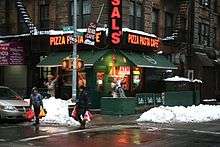Pizza Principle
The Pizza Principle, or the Pizza-Subway Connection, in New York City, is a humorous but generally historically accurate "economic law" proposed by native New Yorker Eric M. Bram.[1] He noted, as reported by The New York Times in 1980, that from the early 1960s "the price of a slice of pizza has matched, with uncanny precision, the cost of a New York subway ride."[1]

In 1985, the late writer, historian, and film critic George Fasel learned of the correlation and wrote about it in an op-ed for The New York Times.[2] The term "Pizza Connection" referring to this phenomenon was coined in 2002 by New York Times columnist Clyde Haberman, who commented on the two earlier publications of the theory in the Times, and predicted a rise in subway fare.[3][4]
In May 2003, The New Yorker magazine proclaimed the validity of the Pizza Connection (now called the pizza principle) in accurately predicting the rise of the subway (and bus) fare to $2.00 the week before.[5] They also quoted Mr. Bram (by then a patent attorney[6]) as warning that since the New York City Transit Authority had announced the discontinuation of the subway token itself[7] in favor of the variable-fare cost MetroCard (also used on the buses at that point), the direct correlation between the cost of an off-the-street slice of cheese pizza and the cost of a subway token might not continue to hold.
In 2005,[8] and again in 2007,[9] Haberman noted the price of a slice was again rising, and, citing the Pizza Connection, worried that the subway/bus fare might soon rise again. The fare did indeed rise to $2.25 in June 2009, and again in 2013 to $2.50.[10] In 2014, Jared Lander, a professional statistician and Adjunct Professor at Columbia University, conducted a study of pizza slice prices within New York City and concluded that the Pizza Principle still held true.[11] Other New York City news organizations occasionally confirm the ability of the Pizza Principle to predict increases in the cost of a single-ride subway/bus fare in the city.[12][13][14][15] In 2019, The Wall Street Journal noted that, due to a combination of a decrease in the fare bonus for a subway ride rather than an increase in the overall fare ($2.75 at the time) and the increased variability of the cost of pizza in New York City, the Pizza Principle was no longer accurate.[16]
References
- Glenn Collins, Metropolitan Diary, The New York Times, June 18, 1980, p.C2
- George Fasel, "If You Understand Pizza, You Understand Subway Fares," The New York Times December 14, 1985, p.27
- Clyde Haberman, "Beware The Price Of a Slice," The New York Times, January 12, 2002.
- Clyde Haberman, "As Inevitable As Pepperoni: Higher Fares," The New York Times, July 9, 2002.
- Nick Paumgarten, "Two Bucks," The New Yorker, May 19, 2003.
- United States Patent and Trademark Office Reg. No. 37,285
- Richard Pérez Peña, "Farewell, Subway Token," The New York Times, March 15, 2003.
- Clyde Haberman, "Digging Deep for a Slice of the Pie," The New York Times, June 21, 2005.
- Clyde Haberman, "Will Subway Fares Rise? Check at Your Pizza Place," The New York Times, July 27, 2007.
- Nate Freeman, "With Subway Fare Upped to $2.50, Will Pizza Slice Prices Follow Suit?," The New York Observer, October 7, 2010.
- Jared Lander, "Average Cost of a New York Slice in 2014, May 23, 2014.
- Garth Johnston, "The Pizza Principle Is Alive And Well! Archived October 18, 2014, at the Wayback Machine," Gothamist, June 28, 2012.
- Chris Weller, "Pizza is the key to this strange economic principle," Tech Insider, October 25, 2015.
- Alex Swerdloff, "What the Price of a Slice of Pizza Can Tell You About New York," Munchies, March 14, 2016.
- Kate Holland, "The Economics of the Dollar Slice: The Pizza Principle," Washington Square News, May 1, 2017.
- Passy, Charles (March 2, 2019). "The MetroCard Derailed the Price of a Slice—at Least That's One Theory". Wall Street Journal. ISSN 0099-9660. Retrieved April 26, 2019.